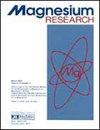Serum magnesium: time for a standardized and evidence-based reference range.
IF 1
4区 医学
Q4 BIOCHEMISTRY & MOLECULAR BIOLOGY
引用次数: 17
Abstract
Magnesium deficiency can have serious health consequences. Low magnesium intake or low serum levels are risk factors for e.g. type 2 diabetes and cardiovascular diseases. Despite its scientifically recognized importance, too little attention is paid to magnesium in clinical practice. This may be due to the fact that there is no uniform and evidence-based reference range for serum magnesium as is the case for other electrolytes such as sodium and potassium. The serum magnesium concentration is also of a limited informative value, as it is maintained for a long time by releasing magnesium from body pools. A low serum magnesium is a definite sign of magnesium deficiency; however, values within the reference range do not rule out deficiencies. Nevertheless, serum magnesium should become part of routine diagnostics in order to be able to better detect deficiency states. For serum magnesium, a reference range of 0.75 to 0.95 mmol/L (1.82 to 2.31 mg/dL) can often be found. However, according to the current data situation, serum magnesium values of less than 0.85 mmol/L are associated with increased health risks. Therefore, the lower limit of the reference range should be raised to 0.85 mmol/L (2.07 mg/dL).血清镁:标准化和循证参考范围的时间。
缺镁会造成严重的健康后果。镁摄入量低或血清镁含量低是2型糖尿病和心血管疾病等疾病的危险因素。尽管科学上承认镁的重要性,但在临床实践中对镁的关注太少。这可能是因为与钠和钾等其他电解质的情况不同,血清镁没有统一的循证参考范围。血清镁浓度也具有有限的信息价值,因为它是通过从身体池中释放镁来维持很长时间的。低血清镁是镁缺乏的明确标志;然而,在参考范围内的值不能排除缺陷。然而,血清镁应该成为常规诊断的一部分,以便能够更好地检测缺镁状态。对于血清镁,通常可以找到0.75至0.95 mmol/L(1.82至2.31 mg/dL)的参考范围。然而,根据目前的数据情况,血清镁值低于0.85 mmol/L与健康风险增加相关。因此,应将参考范围下限提高至0.85 mmol/L (2.07 mg/dL)。
本文章由计算机程序翻译,如有差异,请以英文原文为准。
求助全文
约1分钟内获得全文
求助全文
来源期刊

Magnesium research
医学-内分泌学与代谢
CiteScore
3.50
自引率
9.40%
发文量
6
审稿时长
>12 weeks
期刊介绍:
Magnesium Research, the official journal of the international Society for the Development of Research on Magnesium (SDRM), has been the benchmark journal on the use of magnesium in biomedicine for more than 30 years.
This quarterly publication provides regular updates on multinational and multidisciplinary research into magnesium, bringing together original experimental and clinical articles, correspondence, Letters to the Editor, comments on latest news, general features, summaries of relevant articles from other journals, and reports and statements from national and international conferences and symposiums.
Indexed in the leading medical databases, Magnesium Research is an essential journal for specialists and general practitioners, for basic and clinical researchers, for practising doctors and academics.
 求助内容:
求助内容: 应助结果提醒方式:
应助结果提醒方式:


